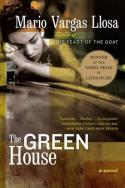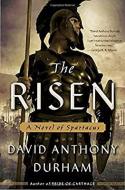Appreciation of Mario Vargas Llosa’s The Green House by David Anthony Durham
I remember wandering through the world literature section of my university library, feeling a bit lost, recognizing few names. On the recommendation of my writing instructor I was searching for a Peruvian novelist named Mario Vargas Llosa. I found a coverless edition of The Green House, one with no blurbs, no review quotes, no author photo or biography. The surprises found inside, then, were complete and unforgettable.
 With The Green House (1966), Vargas Llosa began to explore the ongoing battle that started the moment European culture collided with that of the Americas. The novel is populated by all segments of Peruvian society: indigenous Indians, people of Latin origins, immigrants cast ashore on Peru for myriad reasons — from nuns and Fathers to prostitutes and pimps. There’s even a Brazilian rubber baron–warlord–leper of Japanese ancestry. It ranges from the depths of the rainforest to windblown desert outposts. It’s a novel in which crimes are committed without remorse, conveyed with the brutal honesty of an author confronting the duplicitous exploitation tainting his nation.
With The Green House (1966), Vargas Llosa began to explore the ongoing battle that started the moment European culture collided with that of the Americas. The novel is populated by all segments of Peruvian society: indigenous Indians, people of Latin origins, immigrants cast ashore on Peru for myriad reasons — from nuns and Fathers to prostitutes and pimps. There’s even a Brazilian rubber baron–warlord–leper of Japanese ancestry. It ranges from the depths of the rainforest to windblown desert outposts. It’s a novel in which crimes are committed without remorse, conveyed with the brutal honesty of an author confronting the duplicitous exploitation tainting his nation.
 The story is rendered in prose as varied as its cast: inner monologue, assimilated dialogue, objective third person, or an omni scient point of view, with multiple timelines, concurrent plots, and scenes repeated in layering montage. Honestly, it’s rarely an easy read. One can see the influence of Faulkner, of Sartre and Flaubert, but the manner in which Vargas Llosa transmuted Western influences to enrich his tale remains remarkable. And, I wondered, if this Peruvian writer could do this, what else might be happening out there? By inspiring that question The Green House drew me into a much more complete world of literature. I’ve been grateful to Vargas Llosa ever since.
The story is rendered in prose as varied as its cast: inner monologue, assimilated dialogue, objective third person, or an omni scient point of view, with multiple timelines, concurrent plots, and scenes repeated in layering montage. Honestly, it’s rarely an easy read. One can see the influence of Faulkner, of Sartre and Flaubert, but the manner in which Vargas Llosa transmuted Western influences to enrich his tale remains remarkable. And, I wondered, if this Peruvian writer could do this, what else might be happening out there? By inspiring that question The Green House drew me into a much more complete world of literature. I’ve been grateful to Vargas Llosa ever since.
David Anthony Durham's Top Ten List
1. Beloved by Toni Morrison (1987)
2. The Brothers Karamazov by Fyodor Dostoevsky (1880)
3. The Book of Laughter and Forgetting by Milan Kundera (1978)
4. Moby-Dick by Herman Melville (1851)
5. The Green House by Mario Vargas Llosa (1965)
6. Blood Meridian: Or the Evening Redness in the West by Cormac McCarthy (1985)
7. The Amazing Adventures of Kavalier & Clay by Michael Chabon (2000)
8. The Famished Road by Ben Okri (1991)
9. Dune by Frank Herbert (1965)
10. Watership Down by Richard Adams (1972)
 David Anthony Durham (born 1969) is an American writer whose work explores issues of African-American history and identity and whose later works have veered into fantasy. His debut novel, Gabriel’s Story (2001), featuring a 19thcentury black homesteader and cowboy, was selected as the best first novel by the American Library Association’s Black Caucus. His second novel, Walk Through Darkness (2002), depicted a runaway slave and the Scottish immigrant hired to track him. The Pride of Carthage (2005) was set during the Punic War; Acacia: The War with the Mein (2007) is an epic fantasy set in an alternative world. He continued to explore that universe in Acacia: The Other Lands (2009) and Acacia: The Sacred Band (2012). He returned to the ancient historical world with a novel about the Spartacus rebellion, The Risen (2016). He has also published two young adult novels, The Shadow Prince (2021) and The Shadow Prince: The Longest Night in Egypt (2023). See more at his official website.
David Anthony Durham (born 1969) is an American writer whose work explores issues of African-American history and identity and whose later works have veered into fantasy. His debut novel, Gabriel’s Story (2001), featuring a 19thcentury black homesteader and cowboy, was selected as the best first novel by the American Library Association’s Black Caucus. His second novel, Walk Through Darkness (2002), depicted a runaway slave and the Scottish immigrant hired to track him. The Pride of Carthage (2005) was set during the Punic War; Acacia: The War with the Mein (2007) is an epic fantasy set in an alternative world. He continued to explore that universe in Acacia: The Other Lands (2009) and Acacia: The Sacred Band (2012). He returned to the ancient historical world with a novel about the Spartacus rebellion, The Risen (2016). He has also published two young adult novels, The Shadow Prince (2021) and The Shadow Prince: The Longest Night in Egypt (2023). See more at his official website.